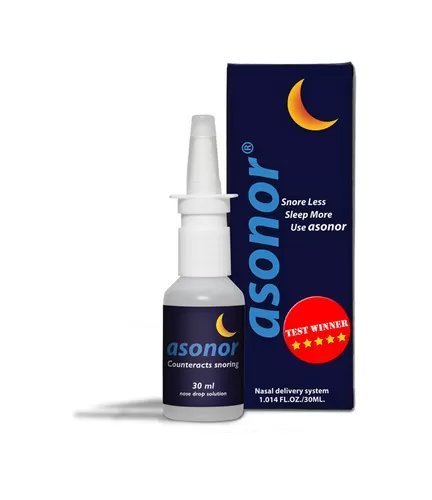Can Steroid Nasal Sprays Help with Snoring?
Discover if steroid nasal sprays can reduce snoring by alleviating nasal congestion and inflammation for a better night's sleep.

Snoring is a widespread issue affecting millions of people worldwide. It happens when air flows through the mouth and nose and is partially obstructed during sleep. This obstruction causes the tissues in the throat to vibrate, producing the familiar, often disruptive sound of snoring. Several factors contribute to snoring, including nasal congestion, obesity, alcohol consumption, and sleeping position. Understanding the root cause of snoring is crucial in determining the most effective treatment.
How Steroid Nasal Sprays Work for Snoring?
Steroid nasal sprays are commonly used to treat inflammation and congestion in the nasal passages. They work by reducing inflammation, which can cause the nasal passages to narrow and make breathing through the nose difficult. When using a steroid nasal spray for snoring, the primary aim is to keep the nasal passages open and reduce any blockages contributing to snoring. These sprays can reduce or eliminate snoring in some individuals by alleviating nasal congestion.
Effectiveness of Steroid Nasal Sprays
While a steroid nasal spray can be effective for snoring caused by nasal congestion, it is not a universal solution for all types of snoring. Their effectiveness largely depends on the underlying cause of the snoring. For instance, if snoring is caused by obesity or alcohol consumption, a steroid nasal spray may not be very effective. It’s also important to note that steroid nasal sprays are typically recommended for short-term use due to potential side effects, such as nasal dryness, irritation, and, in rare cases, more severe side effects like increased pressure in the eyes or a weakened immune response in the nasal tissues.
Exploring Alternatives to Steroid Nasal Sprays
Before opting for a steroid nasal spray for snoring, it’s worth considering alternatives that might be safer and more effective in the long run. Here are some options to explore:
1. Lifestyle Changes
Simple lifestyle changes can significantly reduce snoring. Losing weight, avoiding alcohol before bedtime, and sleeping on your side instead of your back can all help. These changes address the root causes and can lead to long-term improvements.
2. Anti-Snoring Devices
Various devices are designed to help reduce snoring. These include mouthguards, nasal strips, and chin straps. Mouthguards work by repositioning the jaw to keep the airway open, while nasal strips and chin straps help keep the nasal passages clear and the mouth closed. These devices can be a non-invasive alternative to a steroid nasal spray for snoring.
3. Humidifiers
Dry air can irritate the nasal passages and throat, leading to snoring. Using a humidifier in your bedroom can add moisture to the air, reducing irritation and potentially reducing snoring. This simple solution can complement other treatments and provide snore relief.
4. Snore Relief Sprays
Snore relief sprays are another alternative to consider. These sprays moisturise and tighten the tissues in the throat, reducing the vibrations that cause snoring. They are easy to use and can be an effective solution for many people. Unlike a steroid nasal spray for snoring, these sprays often have fewer side effects and can be used more frequently.
How to Pick the Right Solution?
When choosing a solution for snoring, it’s essential to consider the underlying cause of your snoring and overall health. Here are some tips to help you make an informed decision.
1. Consult a Healthcare Professional
Before starting any new treatment for snoring, it’s a good idea to consult with a healthcare professional. They can help determine the cause of your snoring and recommend the best treatment options. This step is crucial, especially if you are considering a steroid nasal spray for snoring.
2. Consider the Cause
Identify what might be causing your snoring. If nasal congestion is the primary cause, a steroid nasal spray for snoring might be helpful. However, you might need a different solution if other factors are at play, such as lifestyle habits or anatomical issues.
3. Evaluate the Risks and Benefits
Consider the potential risks and benefits of each treatment option. For example, while a steroid nasal spray for snoring can be effective for nasal congestion, it has potential side effects. Weigh these against the benefits to determine if it’s your right choice.
Conclusion
Steroid nasal sprays can help with snoring caused by nasal congestion, but they are not a one-size-fits-all solution. Before deciding on the best treatment, it is essential to explore other alternatives and consider the underlying cause of your snoring. Lifestyle changes, anti-snoring devices, humidifiers, and snore relief sprays are all viable options to help reduce or eliminate snoring.
Before starting any new treatment, consulting with a healthcare professional is always a good step. By understanding your situation and the options available, you can make an informed decision and find the most effective solution for your snoring. Better sleep is possible with the right approach, leading to improved health and well-being for you and those around you.
What's Your Reaction?











![Wireless Connectivity Software Market Size, Share | Statistics [2032]](https://handyclassified.com/uploads/images/202404/image_100x75_661f3be896033.jpg)



